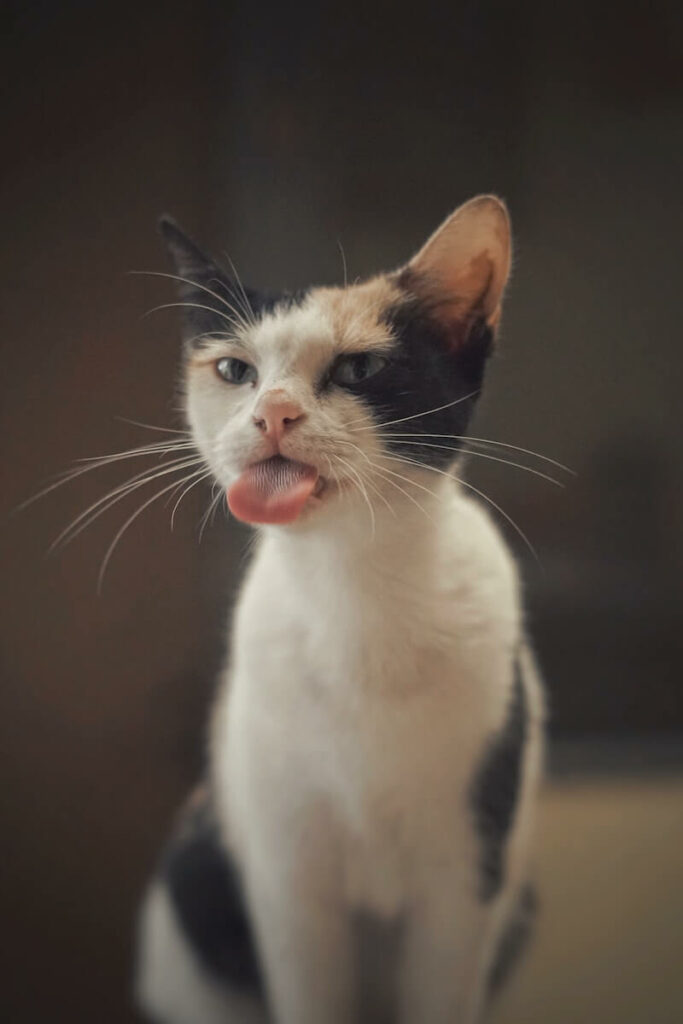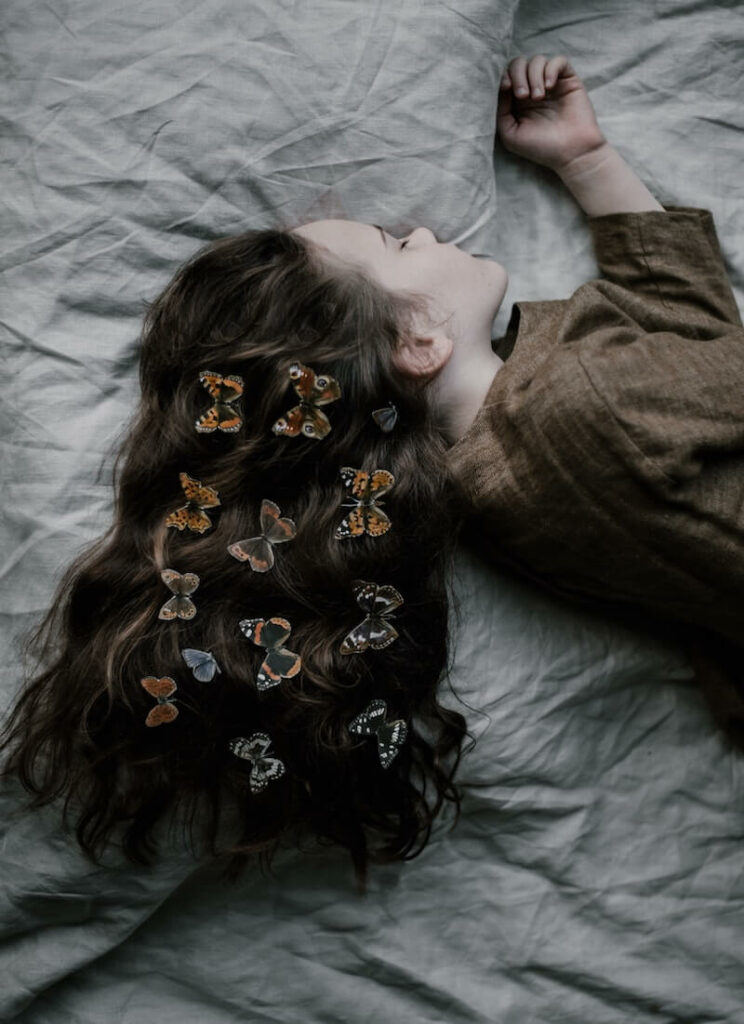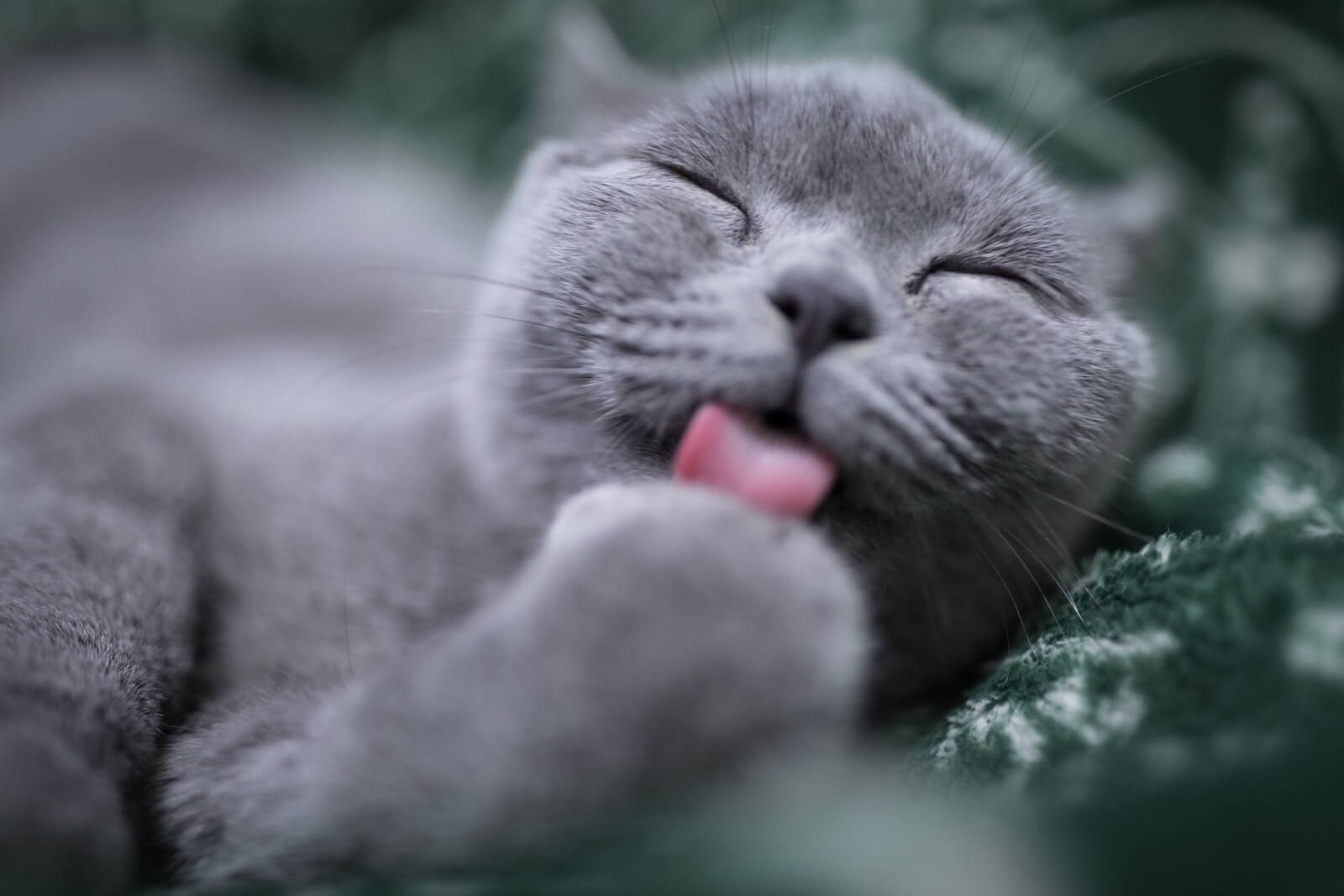Have you noticed that your cat’s tongue is incredibly rough, almost as if it were sandpaper? If your cat has given you a lick or two, I’m sure you have, and although it’s an action we usually associate with dogs, cats do it too. But what if they try to chew your hair? Have you ever wondered, “why does my cat eat my hair“? Here’s why.
A cat’s tongue is covered with hundreds of tiny keratin spines, known as papillae. They have a great function, as they are the tool with which cats clean their fur as if it were a brush. With the rough spines on their tongue, cats can drag all dirt, remove bedbugs and fleas, and unravel the knots in their shiny fur. A perfect gift from nature for an animal that loves to groom itself, so much so that it spends most of the day doing it.

While it is true that cats lick their fur to clean it and keep it healthy, they often give us licks and sometimes even soft bites that seem like our sweet feline is trying to eat a piece of us. Do you know why that happens? Don’t panic. You have nothing to worry about. Your cat might be chewing your hair a little, not eating it. It’s not that your cat wants to hunt you, but it’s sure trying to tell you something. If you want to find out, keep reading, and you will find the answer.
Why does my cat eat/chew my hair? 4 common reasons
Without further ado, here are 4 possible explanations as to why your cat may be doing this:
1. Bonding time
If you thought that cats give licks to everyone just like a dog, you are wrong because a cat only does it with members of its inner circle. In nature, cats help each other to groom in those places they cannot reach by themselves (allogrooming), for example, behind the head or between the ears. Hence, it is common to see a cat approaching another cat from its pack and bending its head down. It is requesting the other for help to finish its bath.
Domestic cats don’t usually have feline companions to share this vital task with, so they must find other resources. Your cat will probably never ask you to intervene in his grooming session, but he will try to clean you with a good, rough lick and the occasional nip here and there.
Just as they clean their companion’s fur, it is logical that they will also clean yours. That’s why they mainly focus on your head, and it’s not that your hair is dirty. Maybe they don’t like your shampoo or consider that you can use a little help from them.
You may not want your cat to help you stay clean but look at the bright side. If your cat is allogrooming with you, it’s because he considers you part of his family. It’s a feline telling you he loves and trusts you very much.
2. Relaxing moment
No one is surprised that cats get stressed very quickly. Although these little guys are indeed very independent, they are also susceptible to external stimuli and, well, to almost everything. A cat can feel anxiety at a change of house, a rearrangement of furniture, a new member of the family, a change in their diet, even the smell of your new lotion, poor things.
When a cat is stressed, they tend to look for activities that help them to regain their calm, and a very popular one is grooming. Besides being one of their favorite hobbies, it allows them to calm down. They don’t always lick their fur, though. Sometimes they resort to sucking on a blanket or chewing your hair. In any case, there is usually no problem. Your kitty is just looking to de-stress a bit.

While you don’t need to worry immediately, you should pay attention to your feline’s behavior. If you notice bald patches in his fur or compulsive nibbling on your hair, your cat may suffer from uncontrollable stress or even an illness leading to an erratic attitude. In these cases, it is best to go to a vet to help you find a solution.
3. Playful kitty
It is expected that when you sleep, your cat comes to lie down next to you. These little furballs enjoy the company of their favorite human. As you know, cats are nocturnal animals, so while you rest peacefully, they are full of energy, and after watching you sleep for a while, it is logical that they get bored and want to play.
This is where chewing on your hair comes into play. Since you are lying down, it is much more accessible and entertaining for them, especially if you have long hair. They pass it from one paw to the other, get tangled in it, and bite or chew on it for quite a while. We don’t necessarily have to understand the game for it to be fun.
4. Pica!
The tendency of particular cats to consume non-edible materials is known as pica. This behavior begins at an early age and usually ends before two years of age, although some cats continue to do so for longer. The cat breeds most prone to developing pica are the Siamese, Burmese, and Tonkinese, although it is also seen in other cat breeds, mainly different Oriental types.
They usually choose fabrics such as wool, perhaps because of its soft texture, although a cat with pica can choose any non-edible material, from cloth, wood, plastic, or even human hair. The reason for pica is unknown, but it is thought that consuming the material gives them some pleasure.
Although it is not necessary to take your cat to the vet if he has pica, you should observe what type of material he chooses to consume because it may be toxic to his health or it may cause an intestinal obstruction.
Why does my cat eat my hair, and how to prevent it?
Although it’s not dangerous for your cat to bite your hair, we understand that it can be a nuisance, especially if it becomes a habit. Fortunately, there are several tricks you can try, although the most important thing will always be to identify why your cat chews or eats your hair. Perhaps it’s a medical problem you should address as soon as possible.

If you notice that your cat has this habit because he is stressed, try to eliminate what causes him fear or anxiety, you will see how quickly he changes his attitude and relaxes. On the other hand, if your cat is playing or wants to socialize with you, you can change this behavior by walking away when he starts doing it.
This way, he will associate biting your hair with your lack of attention. You can also try distracting him with something, such as a soft noise that makes him turn around, a laser, or a toy that attracts his attention.
Erasing this habit will take time, so be patient and remember that scolding or punishing your cat can be counterproductive, as he will most likely not understand what he is doing wrong and become even more stressed.
